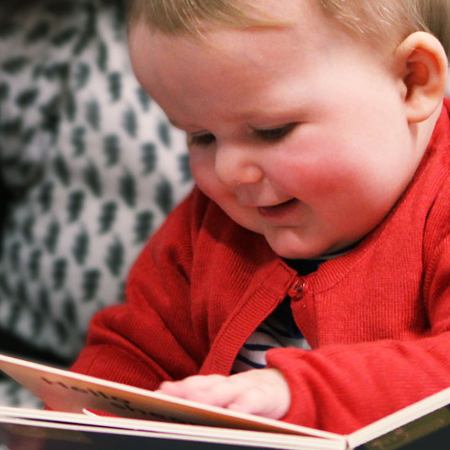The Magic of Reading
Age 0–4: How to Ignite a Lifetime of Reading for Pleasure
It’s never too early to start reading to children – even very young babies will benefit from the experience. They will enjoy being held and hearing your voice. At this stage it doesn’t actually matter what you read – you could even read your own book out loud to them! As they grow, establishing a reading routine, hearing voices, singing nursery rhymes and associating looking at books with the comfort and security of being with a parent are the important things. Use every opportunity you can find to read to your child – when they are feeding, when they are in the bath and when they are being cuddled. Picture books, lift-the-flap and novelty books with different textures are all good types of books to introduce. Your child will associate reading with positive happy feelings and this is a great foundation for establishing their own reading habit.

How Long Should You Read For?
For very young children, five to ten minutes is perhaps all their attention span can cope with. As your child gets older and bedtime becomes much more regular, spend as much time as you can spare.
Reinforce the Magic of Story
Take the opportunity to reinforce the fun and enjoyment of reading by choosing a character and then substituting your child’s name. Try to bring stories to life in the real world – for example, if you read Mr Wolf’s Pancakes by Jan Fearnley, make pancakes afterwards and talk about the book.
Tips for Reading Aloud to Your Pre-schooler
Use colour, rhythm and intonation in your voice to vary the tone. It can be fun to really exaggerate; for example, use a sharp intake of breath to show extreme surprise or anticipation, or say, ‘OH NO!’ for any dangerous situation, and so on. Ham it up. They’ll love it!
- Use different voices and accents for different characters.
- Encourage your child to complete familiar phrases by pausing before the end of the sentence. They like repetition and love to show they know what is coming next.
- Spend plenty of time on the pictures if your child seems to enjoy this aspect. As they learn to talk you can ask: ‘What can you see?’ You can also pretend that you can’t see something; your child will love knowing more than you do!
- Bring books to life! For example, if you’re going to the seaside, find a seaside book. If you’re taking a trip on a train, read a book about a train journey.
- Slow down. Allow yourself plenty of time to get the most fun out of each word and sentence. It doesn’t matter at all if you stumble over some of the words.
- You don’t have to finish it! If their attention starts to wander, ask your child if they would like a different book and let them choose it.
The information and tips on this page are taken from Help Your Child Love Reading, which contains advice on encouraging reading for every age group – from babies to teens.

